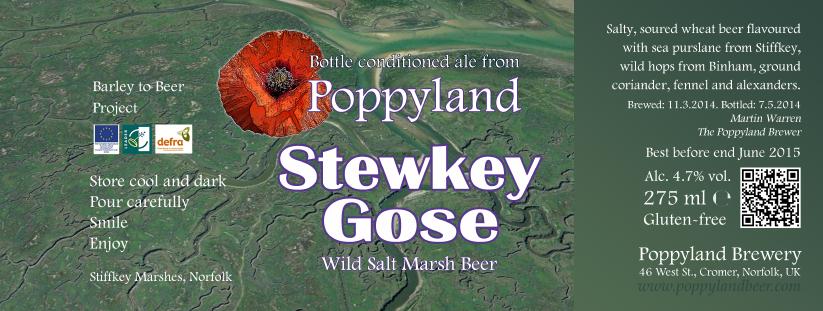Stewkey Gose
Gose 4.7%
Bottle conditioned, 275 ml 'London half pint' and 375 ml champagne bottles.
Release date: June 2014

I have been researching and exploring the subject of gose (pronounced 'gose-uh'), the revived German sour, salty style of top fermented witbeer. To me it seems a natural accompaniment to salty seafoods and also a light, refreshing, isotonic drink in its own right, so ideal as a seaside beer.
There are numerous ways of producing a sour beer: (a) spontaneous fermentation from wild yeasts (lambic style), (b) creating a sour mash that utilises the naturally occuring Lactobacillus in the grain, (c) primary fermentation of the wort with a cocktail of souring bugs or (d) introduce wild bugs in secondary, either (d.i) from a culture, (d.ii) from storage in an old wooden barrel or (d.iii) from the skins of fruit.
This beer is inspired by the beautiful salt marshes of the North Norfolk coast. Stewkey is a corruption of Stiffkey, the iconic flint-built village set in uncharacteristicly rolling landscape of the River Stiffkey. This version of the name was only ever applied to Stewkey Blues, the cockles stained blue-grey by iron sulphide from the mud on the sand flats. The village is always Stiffkey. Anyway, I wanted to make a beer to celebrate the marshes and what better way than to incorporate some ingredients from the marsh itself? I shied away from using cockles but I did use sea purslane from the marsh in the boil, replete with plenty of mud for the flavour! It is broadly based on the gose style, being gently soured (with a Berliner Weiss yeast culture) and slightly salty. The traditional coriander spice was supplemented with fennel which grows at the back of the marsh and alexanders that grows along the lanes near the coast. The hopping is very light, as it can inhibit the Lactobacillus and hoppiness does not marry well with sourness. I am very pleased with the result and judging by the comments of my customers, so are they.
The beer took some time to develop its acidity but it got there by late summer. This comes from lactic acid created by Lactobacillus in the Berliner Weiss culture. The slowness taught me a lesson and next time I shall do a sour mash to achieve the same effect in just a couple of days rather than several months.
What the customers say
"Oh my god Manish this is UNBELIEVABLY good beer" Matt Walls, beer writer, on Twitter
"Trying a Stewkey Gose wild saltmarsh wheat beer. Not 100% sure what 'sea purslane' is, but tastes great!" Will Jackson, on Twitter
"Never tasted a beer like it, awesome!" Stuart Dowle, on Twitter
"Salty, sweet, herbal, refreshing. Intriguing beer!" 9Squirrels on Untapped
" @cliff_bunny it was very good! Very different and refreshing. Yes please brew some more!" @IAmMrsWild
Cheers
Martin Warren, The Poppyland Brewer
 Poppyland Beer
Poppyland Beer